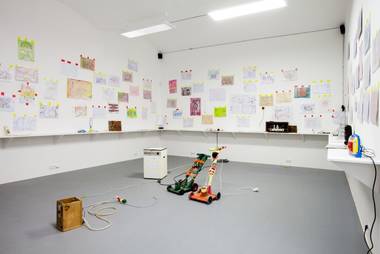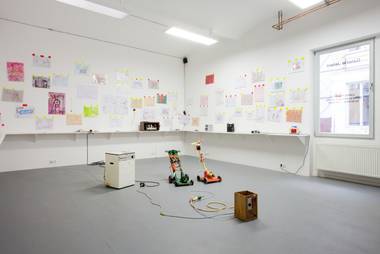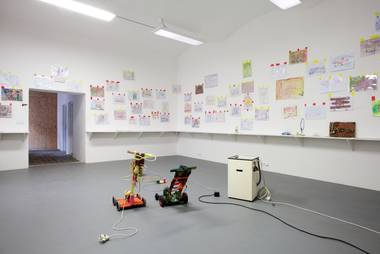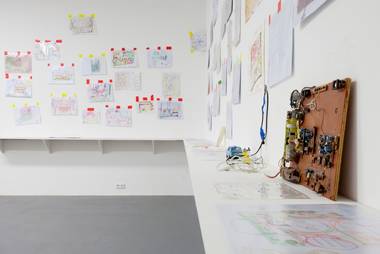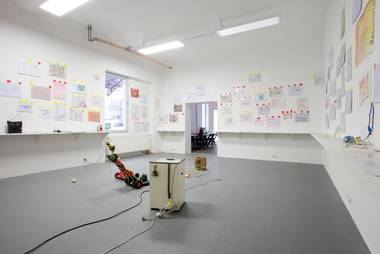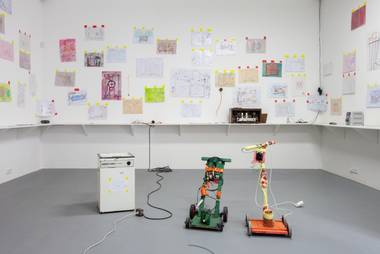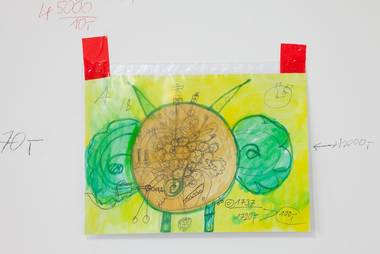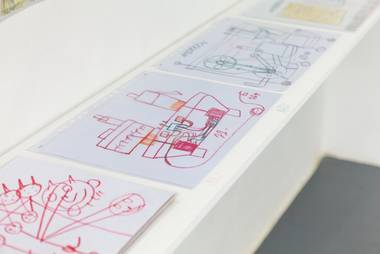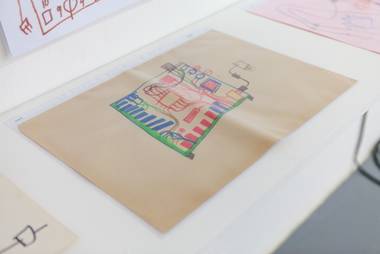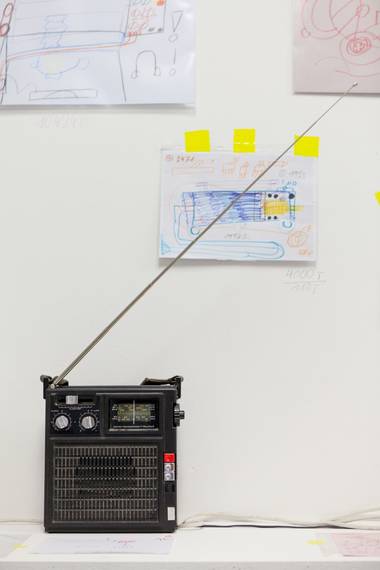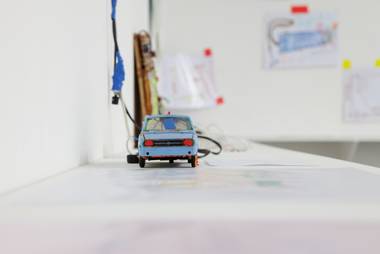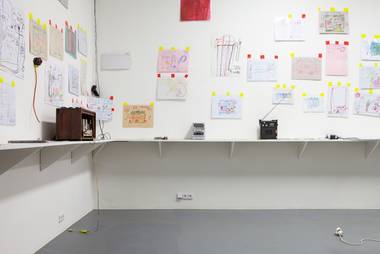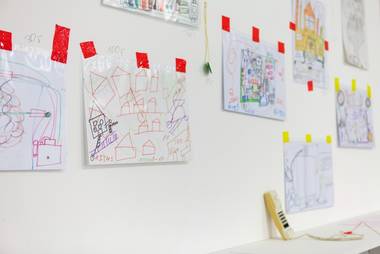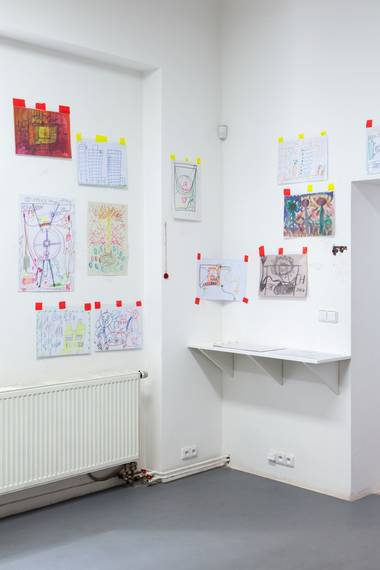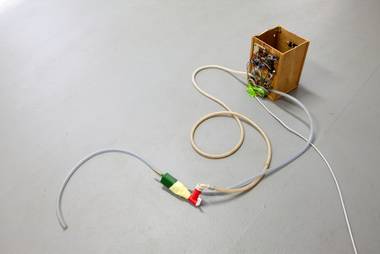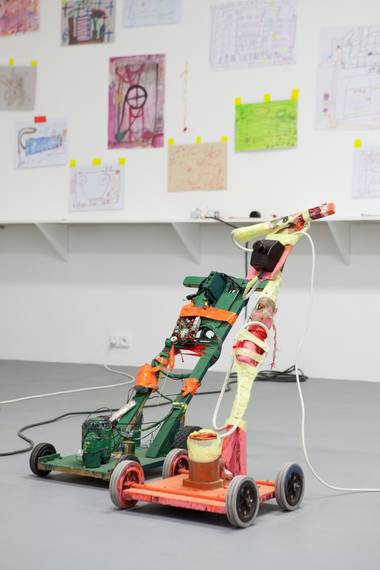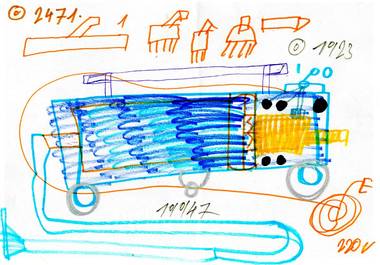Lukáš Paleček: Romo Washing Machine Washes Cucumbers
10. 5. - 2. 6. 2019
opening: 9. 5. 2019
performance given by Lukáš Paleček: 16. 5. 2019
from 6 PM
in collaboration with Alma Lily Rayner and Eva Koťátková
Instructions for using machines by Lukáš Paleček: Press the button, turn the nob, go through the drum inside to see Lukáš and then back again.
The washing machine washes. Although there is no water coming out of it, the drum is spinning and it is making loud noises, testifying there is movement inside. The hose is sticking out into space waiting to be connected. All sorts of cables are winding through the space like an unsettled animal: some of its parts are resting on the floor, twisted on the back part of the washing machine, or they are venturing out into the space. Several machines are waiting to be connected, the instructions also offer some buttons to be turned on. The radio is playing according to momentary mood, which quickly changes: it tunes, explodes, becomes silent, the content or volume cannot be predicted. More numbers are appearing on the wall; they are the prices corresponding to the individually drawn machines. Most of them are out of the scope of our possibilities. We can hear the machines’ spokesperson from the loudspeakers and he gradually introduces all the machines. Gently, as well as expressively, depending on each machine.
Lukáš Paleček is the author of pantomimic performances in which he lends his voice to various things and appliances and brings them back to life. He is interested in old appliances such as washing machine brands Romo and Tatramat or radios and tape recorders by the Tesla brand. He also constructs his own devices from components that he finds. He draws their anatomy with the help of pencil crayons, felt pens or ballpoint pens on small formats the character of which resembles x-ray images – statements about the inner condition.
Lukáš’ relationship to machines has several levels. Lukáš collects machines. He either finds them or gets them from his friends who know about his hobby. He shares his workshop with his dad and they both have their own machines. The ones that belong to Lukáš are usually not functional or only partially. One shelf contains only parts – disassembled body parts. Lukáš repairs them – he performs anatomic excursions. Other times he cares for the machines using plastic tapes, he creates splints for them and fixates their fractures. He draws attention to their parts. Parallel to his work in the workshop, Lukáš creates imaginary machines that function precisely according to his needs and imagination.
Lukáš observes the machines, he listens to them, mimics them and studies their language. He expands, as well as erases his own playlist. In spite of that he is not only a human machine, a jukebox. Lukáš is building his own repertoire, while he thoroughly examines the sound expression of the objects that are a part of it. This way he tests and trains his own sensitivity, ability to imitate and memory. At the same time, it appears that the machines enable him to enrich his own means of expression and expand the possibilities of his own language. It appears that the machines’ language presents possibilities to express emotions in a more pleasant way and compensates for what the human language is limiting.
Lukáš is, more than anything, an artist-performer. He often realizes his performances unexpectedly, in reaction to specific situations, ideas, or impulses. He produces his performances as a director/choreographer and plays the lead role at the same time. He arranges viewers in space, suggests a specific position and role they should play in a given situation. He creates temporary order, functional mechanisms made up of people and their relationship in space.
Lukáš does not create his work with the primary goal to present and exhibit. In spite of that his work is his main communication channel – a way/reason to enter interaction with others. He often donates his work to someone, it becomes a gift, something that is supposed to bring momentary joy and confirmation of inclination, or it is a form of a joke.
Lukáš does not place value on his work. In the case there are some numbers on it, they represent the price of the machines that the drawings depict. These often reach absurd levels and point out Lukáš’ fascination with the system of financial evaluation and its absurdity.
Lukáš is not interested in his works in their finished state – he repeatedly gives them new names, finishes or changes them, or he decides to erase them or throw them out based on his momentary urge or need. During the installation he touches them up, labels them, and adopts (domesticates) the space and what is in it.
Lukáš’ perception of time is quite different from the capitalistic linearity, which aims for an effective result and productivity. The important thing for Lukáš is here and now – momentary connection and experience, the intensity of the situation currently taking place. It is important that the washing machine is washing, that the machine is working and making sounds – confirmation that it functions.
For Lukáš, work is a way of communicating with others in the nearest surroundings, similarly to going for a walk, drinking coffee, or listening to music with someone. When he is working he cannot last long doing one thing; in his work/daily functioning he needs to switch between walking, drawing, snacking, connecting or repairing machines, and communication with others.
The exhibition is trying to present Lukáš’ view of the world through the language and logic of machines. He presents human society through technological waste that it produces: bodies of old electronic devices often eliminated from operation. Machines on paper, placed in space, as well as their voices interpreted by Lukáš create a temporary collective machine that is entered by Lukáš as its author and manager. He sets the machine in motion through various interventions and performances, he invites us to become a part of it for a moment and at the same time sets clear boundaries: he tells us through labels which machines we should leave alone and which ones are waiting to be activated – to be able to speak once we push their button. If we are lucky we will get to hear several of them at the same time. At the end of the exhibition the collective machine will disappear and fall apart back to drawings, objects and cables that fixate them in space. They will go back to Lukáš who will perform new adjustments on them and propose a new network between them.
(The text originated during the final days of work on Lukáš’ exhibition, with the sounds of the machines on)
Eva Koťátková
transl. Vanda Krutsky
Lukáš Paleček (born 1977) lives and works in Prague. Since 2013 he creates his works - drawings, objects, sound performances in Ateliér radostné tvorby (Studio of Joyful Creation) at Letná, a creative workshop which focuses on the support of what is called "spontaneous creativity". Lukáš participated in several group exhibitions organized by the Ateliér, among others in Kampus Hybernská, Center for Contemporary Art DOX or gallery NOD.
More about Lukáš: www.works.io/lukas-palecek
Exhibition of Lukáš Paleček is part of a project called Artist Statement, through which the association Barvolam tries to bring attention to artists labelled as artists with mental handicap or autism and present their work. Barvolam` s philosophy is that not only artist needs an audience, but that also society needs to be confronted with the unique perspective which these neurotypical artists can offer.
More about Barvolam and Ateliér radostné tvorby: www.barvolam.cz, www.atelierradostnetvorby.cz
The program of the Jeleni Gallery is possible through kind support of Ministry of Culture of the Czech Republic, Prague City Council, State Fund of Culture of the Czech Republic, City District Prague 7
Partners: Kostka stav
Media support: ArtMap, jlbjlt.net and UMA: You Make Art
